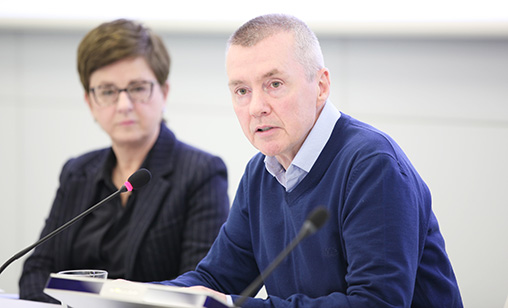Airline Outlook 2023
Relaxing China’s COVID policy key to full recovery
December 1st 2022
At press time, China finally eased some of its rigid pandemic restrictions, but airlines do not expect the country’s borders to fully open to international traffic any time soon. Read More »
International Air Transport Association (IATA) director general, Willie Walsh, said there are “some positive signals” of relaxed rules, but the airline body did not see any significant change in the Mainland’s zero-COVID policy until mid-2023.
 |
“We are hopeful that in the second half of next year we will see traffic starting to return to more normal levels,” IATA said.
Walsh, speaking earlier this month at IATA’s Global Media Days in Geneva, said China is a critical market for Asia-Pacific airlines and its failure to lift restrictions on international travel is one of the main reasons the region’s recovery has lagged behind the rest of the world.
He pointed out that in pre-pandemic 2019, China’s domestic market alone represented nearly 10% of global commercial airline travel. And despite Beijing’s insistence on remaining isolated in its battle to contain the pandemic’s spread, Walsh said there is reason to be optimistic about growth in China. “It is clearly an exciting market from a growth point of view,” he said.
The good news for the global airline industry is IATA predicts a return to profitability for airlines in 2023, with carriers expected to post a collective but small net profit of $4.7 billion for the year. The results will be a tiny net profit margin of 0.6% per seat, but it will be the industry’s first year in the black since 2019. From 2020 to 2022, the world’s airlines reported total losses of $189.4 billion.
For Asia-Pacific airlines, the news is not so good. They are forecast to continue in the red, posting losses of $10 billion this year and a combined deficit of $6.6 billion in 2023.
“The Asia-Pacific is critically held back by China’s zero-COVID policies on travel. The region’s losses are largely skewed by the performance of China’s airlines, which face the full impact of government policy in both domestic and international markets,” IATA said. “Taking a conservative view of a progressive easing of restrictions in China in second half 2023, we expect strong pent-up demand to fuel a quick rebound in the wake of such moves. The region’s performance also receives a significant boost from profitable air cargo markets, in which the Asia-Pacific is the largest player.”
China’s pandemic policies notwithstanding and taking into account global uncertainties in the business and consumer climate, Walsh said the outlook for aviation in 2023 remains positive. Some countries might experience recession next year, but “we don’t see a recession in 2023 at a global level”, he said.
“There are challenges without question - high inflation, high oil prices, slowing economic growth - but there is scope for the industry to recover in 2023 and into 2024.”
 |
Resilience has been the hallmark for airlines during COVID-19, he said. “As we look to 2023, the financial recovery will take shape with a first industry profit since 2019. This is a great achievement considering the scale of the financial and economic damage caused by governments’ pandemic restrictions,” Walsh said.
“But a $4.7 billion profit on industry revenues of $779 billion illustrates there is much more ground to cover to return the global airline industry to a solid financial footing.
“Many airlines are sufficiently profitable to attract the capital needed to drive the industry forward as it decarbonizes. But many others are struggling for a variety of reasons including onerous regulation, high costs, inconsistent government policies, inefficient infrastructure and a value chain where the rewards of connecting the world are not equitably distributed.”
IATA warned airline efforts to be sustainable likely will lead to higher air fares. At the Media Days, Walsh pointed out SAF (Sustainable Aviation Fuel) can be four times more expensive than jet kerosene.
There also will be a cost to transition to net-zero emissions for many industries, but for the airline industry, that cost will represent a “major challenge”, given their financial position at the moment, IATA said.
“There is no way they (airlines) will be able to absorb that, so I expect consumers will have to recognize ticket prices will increase to reflect the very significant rise in costs airlines will face,” he said.
Higher air fares could affect demand for air travel, he conceded. “We know many people are very price sensitive when it comes to flying. Price is a very important element in the decision to fly. I think we have to be honest with consumers,” he said.
People who believe the transition to sustainability is going to be painless are “misleading” the cost to the industry, Walsh said. “At a gross level, from now to 2050 we are talking about trillions of dollars,” he said.
Looking ahead, Walsh said the job of airline managements will remain challenging and a careful watch on economic uncertainties will be critical.
“The good news is airlines have built flexibility into their business models to handle the economic accelerations and decelerations impacting demand. Airline profitability is razor thin with each passenger expected to contribute an average US$1.11 to the industry’s net profit. In most parts of the world that is far less than the cost of a cup of coffee,” he said.
“Airlines also must remain vigilant to any increases in taxes or infrastructure fees. And we will have to be particularly wary of fees introduced in the name of sustainability.
“Our commitment is to net-zero CO² emissions by 2050. We will need all the resources we can muster, including government incentives, to finance this enormous energy transition. More taxes and higher charges will be counter-productive.”
At the Geneva gathering, IATA released details of a recent poll in eleven global markets. It showed nearly 70% of people are traveling as much or more than they did before the pandemic. The economic situation is concerning to 85% of air passengers, but 57% of them have no intention of curbing travel habits. The same study demonstrated the important role travelers attach to the airline industry.
Around 91% of respondents said connectivity by air is critical to the economy and air travel is a necessity for modern life. And 87% of respondents said air travel has a positive impact on societies.
megan moroney says:
January 27th 2024 05:31pm